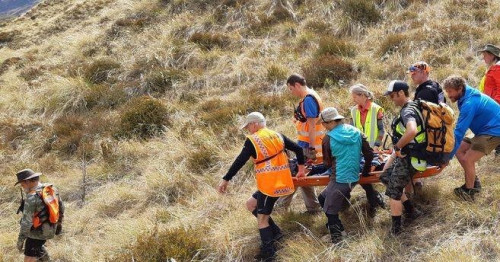Funding boost for New Zealand Land Search and Rescue increases procurement capability
Increased funding for Land Search and Rescue to expand its procurement team and buy new equipment for volunteers who help rescue New Zealanders.

New Zealand Land Search and Rescue volunteers in action. Photo: Supplied.
A funding boost worth millions will beef up the procurement arm of Land Search and Rescue.
Over 3 years, $15.562 million will be spent by Land Search and Rescue on:
- expanding its procurement team
- equipment for its volunteers conducting searches for people lost in the bush.
Land Search and Rescue Chief Development and Project Officer Johnny Franklin said there is an equipment programme being put in place to provide every volunteer with all the equipment they need to do their job.
“We want all groups equipped to a minimum standard.
“Historically our approach was quite demand driven. A group would tell us what they wanted, and we would supply it if we could. There was little standardisation around clothing, equipment etc.”
Now the approach is more supply driven.
“We have a plan of what we will be providing each year, at least initially, and that will be standardised as far as is practical. This procurement approach gives us better leverage with suppliers – although it does sometimes limit our suppliers or we need to have alternatives for items so suppliers can meet our quantities.”
The funding will mean a lot to everyone at Land Search and Rescue and those that interact with the organisation, especially those who need to be rescued.
“Our volunteers would do what they do with their own gear. However, being able to provide them with appropriate gear has a number of benefits. It allows us to create standardisation – which has operational benefits and also allows economies of scale. For clothing, it allows us to purchase at scale. This means we are not constrained by the retail market options: seasonal colour, etc.
“Having a clear uniform appearance has operational benefits. Volunteers are easily recognised by the public which can help with a search and rescue operation. It also creates a sense of belonging for volunteers which is important for teamwork. Reducing any financial burden on volunteers aids recruitment and retention, especially those who might not be able to afford to be volunteers. This wider view has operational capability benefits and creates a more sustainable organisation going into the future.”
The funding increase for procurement will also lead to job creation.
“In the short term as we establish systems to deal with the increase we will need staff. We will need additional staff to manage the goods inwards and outgoing items, as that quantity will significantly increase in the future.”
The funding is an acknowledgement of Land Search and Rescue’s work and endorses the big effort last year in making the business case for the funding, said Johnny.
“As a volunteer myself, I was excited about the opportunity of having a set of gear that I could dedicate to search and rescue, rather than having to use my personal gear. It will always be ready to go.”
Before the funding was announced Land Search and Rescue traditionally sourced equipment for volunteers through a mix of funding sources, such as government, grants, charitable sources, and volunteers.
Land Search and Rescue Board directs a focus on broadening procurement criteria
It is no longer just biggest bang for smallest buck.
Land Search and Rescue’s Board has directed its commissioning and purchasing projects towards local businesses.
“We’re conscious of our environmental footprint and we have a policy to reduce it as far as possible. However, an increase in funding of this scale is inevitably going to lead to an increase in that footprint. That said, cost is not the only determining factor for our decision making. First and foremost is fit for purpose and safety. After that we will consider cost, environmental impact and longevity.”
Johnny said there is also a desire to support local businesses, not only from the board but also from volunteers.
“We take that into consideration too, especially for clothing.”